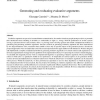Free Online Productivity Tools
i2Speak
i2Symbol
i2OCR
iTex2Img
iWeb2Print
iWeb2Shot
i2Type
iPdf2Split
iPdf2Merge
i2Bopomofo
i2Arabic
i2Style
i2Image
i2PDF
iLatex2Rtf
Sci2ools
127
click to vote
AI
2006
Springer
2006
Springer
Generating and evaluating evaluative arguments
Evaluative arguments are pervasive in natural human communication. In countless situations people attempt to advise or persuade their interlocutors that something is desirable (vs. undesirable) or right (vs. wrong). With the proliferation of on-line systems serving as personal advisors and assistants, there is a pressing need to develop general and testable computational models for generating and presenting evaluative arguments. Previous research on generating evaluative arguments has been characterized by two major limitations. First, researchers have tended to focus only on specific aspects of the generation process. Second, the proposed approaches were not empirically tested. The research presented in this paper addresses both limitations. We have designed and implemented a complete computational model for generating evaluative arguments. For content selection and organization, we devised an argumentation strategy based on guidelines from argumentation theory. For expressing the co...
AI 2006 | Artificial Intelligence | Computational Model | Evaluative Argument | Natural Human Communication |
Related Content
| Added | 10 Dec 2010 |
| Updated | 10 Dec 2010 |
| Type | Journal |
| Year | 2006 |
| Where | AI |
| Authors | Giuseppe Carenini, Johanna D. Moore |
Comments (0)

